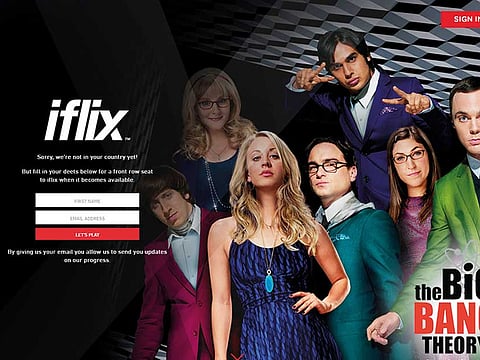Web TV providers train their sights on MidEast audiences
Malaysia’s iflix beams in with a mass market approach as it goes big on local content

Dubai: Web-delivered video-on-demand in the Middle East needn’t be all about Netflix winning subscribers over. Not if the people behind iflix have anything to do with it.
As it puts the final touches to an imminent UAE launch plan — and having already gone live in Saudi Arabia, Kuwait and Lebanon — the platform believes that there are gaps within the video-on-demand market that can be exploited. And the best way to go about doing it are through alliances with regional telcos... and at a price point lower than the competition. Its Middle East operations were announced in February.
“We have just launched the direct app uptake [in the region], but our model is about working closely with telcos and getting that right,” said Nader Sobhan, the head of Mena operations. “We have one with Zain and that takes us into the six regional markets it is in.
“We are right now looking through the strategy for our UAE launch — this market requires a slightly different kind of mix from, say, a Saudi Arabia or Kuwait.”
And iflix has no issues with saying that what it offers is aimed for a mass market audience, and its price points — 15 Saudi riyals (Dh14.68) a month in Saudi Arabia or $4 (Dh14.69) in Lebanon — do come in lower than the main competition. This approach, according to Sobhan, has much to do with iflix’s legacy.
Headquartered in Malaysia, it was launched to target south-east Asian markets and that meant “Price points had to be affordable. Or otherwise it would have become too expensive to drive customer change,” said Sobhan. “Then we realised that we could transfer the model to emerging markets as a whole and not just southeast Asia.”
Investors also seem keen to follow this story — the US movie studio MGM came on board just months after the mid-2015 launch. And then the UK’s Sky and others.
In March, iflix pulled in an additional $90 million from investors on top of the $50 million raised in March 2016. On the operational side, iflix was able to hit its stride quickly enough, crossing the 1 million subscriber mark in south-east Asia within six months of the launch.
It is now working towards a repeat showing in the Middle East and North Africa. Aligning with telcos gives it instant access to a sizeable audience which could be persuaded to sign up for its content.
And what that content needs is an “approach that is as much art as it is science,” said Sobhan. “You see that everywhere — in the way an Apple, MBC or OSN make content work for them.
“What we need to do is balance that out with a data-driven approach. What sort of mix should we have of western, regional and local fillers. That requires on the ground expertise to pick out. For instance, should we beef up Khaleeji content for a Kuwaiti audience or should we have more of action movies for Saudi Arabia. We start with a hypothesis and the use data to come up with a conclusion.”
And come Ramadan, it will debut a sitcom — ‘Waklinha Wala’ — on its platform. “Regional broadcasters typically had a lock on Ramadan viewing content and we wanted to break that with our own locally produced content,” said Sobhan.
“In this region, any content mix will be built around three pillars — predominantly international and balance that with Turkish and Bollywood fare and, finally, local. But we don’t believe that Arabic content is monolithic — the aim is to be hyper local. For that to happen, we need to be in constant dialogue with viewers in each of the country markets. The need is to learn enough in the initial phases, and for that we would rather listen than talk.”
Subscription-based services can talk on video piracy and slay it
The fight against video piracy in the Middle East is a near constant one. Original content providers and platforms cannot let their guard down even for short breaks.
But, with the rise and rise of subscription-based services, which makes access to content more accessible to a larger viewer base, the war on piracy can be won, according to Nader Sobhan of iflix.
“Sure, piracy is the main competition — but do viewers need to be confronted with mushrooming websites and possibly infected with malware?” queries Sobhan. “You could end up downloading and watching wrong episodes or those that come in Croatian subtitles and dubbed in another language.
“People don’t wake up wanting to be video pirates. It exists because of demand that is not being met. Subscription services at the right price points can offer a clean solution from the past.”



